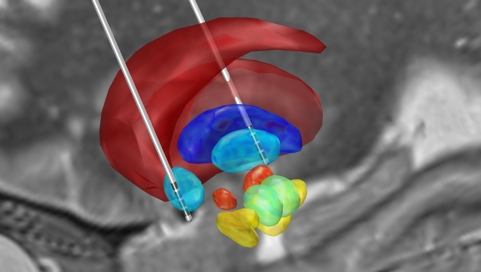Session Information
Date: Monday, June 20, 2016
Session Title: Surgical therapy: Parkinson's disease
Session Time: 12:30pm-2:00pm
Location: Exhibit Hall located in Hall B, Level 2
Objective: To develop an open source software capable of performing electrode localizations certified for clinical use in deep brain stimulation therapy.
Background: Deep brain stimulation (DBS) of the subthalamic nucleus (STN) is a highly efficacious and well-established treatment in Parkinson’s disease. To optimize treatment outcome and to better understand the mechanism of action of DBS, a precise localization of DBS electrodes is necessary. A scientific open-source software has been released in 2014 under the name ‘Lead-DBS’ (Horn & Kühn, 2015) for the purpose of electrode localization based on post-operative imaging.
Methods: The Lead-DBS toolbox was analyzed and subdivided into i) core functions that are needed within the clinical routine and ii) additive functions that are only necessary in a research context. Core functionality was re-designed to optimize usability of the software. The novel version of the toolbox is being certified as a ‘Medical device’ according to european 93/42/EWG guidelines making this new version applicable and safe to use in a clinical routine.
Results: The novel version Lead-DBS MD resulted in a simple design of the software and groups the processing pipeline into three major steps for the user (co-registration, normalization and reconstruction) which are processed automatically after clicking on the button ‘process and reconstruct’. In comparison to Lead-DBS, the user interface of Lead-DBS MD does not allow any fine-tuning of parameters but uses standard settings. The results of the electrode localization can be visualized two- and three-dimensionally and the ‘volume of activated tissue’ can be modeled. Figure 1 shows an example reconstruction result performed with Lead DBS MD.  Fig 1: Example reconstruction and visualization result of Lead DBS MD.
Fig 1: Example reconstruction and visualization result of Lead DBS MD.
Conclusions: A novel version of the 2014 released software Lead-DBS has been designed and evaluated, namely Lead-DBS MD. This version of the software is easy to use and runs stable but has reduced functionality compared to the scientific version. It is open source and being certified as a ‘Medical device’ to conform to european 93/42/EWG guidelines and thus will be useable in clinical routine in the future. Reference: Horn, A., & Kühn, A. A. (2015). Lead-DBS: a toolbox for deep brain stimulation electrode localizations and visualizations. NeuroImage, 107, 127–135. doi:10.1016/j.neuroimage.2014.12.002.
To cite this abstract in AMA style:
S. Ewert, A. Horn, P. Plettig, M. Ruch, A. Kühn. Toward clinical use of electrode localizations in deep brain stimulation therapy [abstract]. Mov Disord. 2016; 31 (suppl 2). https://www.mdsabstracts.org/abstract/toward-clinical-use-of-electrode-localizations-in-deep-brain-stimulation-therapy/. Accessed February 25, 2026.« Back to 2016 International Congress
MDS Abstracts - https://www.mdsabstracts.org/abstract/toward-clinical-use-of-electrode-localizations-in-deep-brain-stimulation-therapy/
